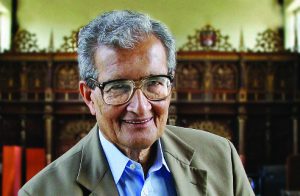Memo #79
 On April 21, 2011, Amartya Sen, recipient of the 1998 Nobel Prize in Economic Sciences, was awarded an honorary degree by the University of British Columbia.
On April 21, 2011, Amartya Sen, recipient of the 1998 Nobel Prize in Economic Sciences, was awarded an honorary degree by the University of British Columbia.
Professor Sen joined UBC in celebrating two milestones: 40 years since the launch of the Interdisciplinary Studies Graduate Program, and 150 years since the birth of Rabindranath Tagore. In his speech, “Discipline and Beyond,” Sen dealt with both interdisciplinarity and Tagore, inviting the audience to reflect on the need for reasoning that is both open and inclusive. Tagore was a living exemplar of such inclusivity. On Thursday, May 12, 2011, Asia Pacific Memo will be the first to publish the full text and video recording of Sen’s speech, including the question and answer session with UBC students.
In today’s interview, Sen concentrates on his deep personal connection with Tagore, who gave Sen his name and influenced his thought. Sen is especially moved by Tagore’s deep faith in the necessity for openness in the pursuit of knowledge. In Tagore’s vision, the future of India and the world depend as much upon non-sectarianism as on freedom and reason. Discipline, Sen believes, is productive only when the human mind trains itself to see beyond discipline into free enquiry. To illustrate this ideal, Sen quotes one of Tagore’s most moving passages:
Where the mind is without fear and the head is held high;
Where knowledge is free;
Where the world has not been broken up into fragments by narrow domestic walls;
. . . . .
Into that heaven of freedom, my Father, let my country awake.
Part 1 – Rabindranath Tagore’s contemporary meaning and significance (3:08 min)
[youtube]https://www.youtube.com/watch?v=6z9ic-dMip8[/youtube]
Part 2 – How did Tagore influence your life? (2:16 min)
[youtube]https://www.youtube.com/watch?v=c9S05tqGO-k[/youtube]
Part 3 – Did Tagore give you the name Amartya? (1:22 min)
[youtube]https://www.youtube.com/watch?v=DNLkTqSvIBc[/youtube]
Related Memos:
- See Amartya Sen’s Memo, Nobel Laureate Amartya Sen Receiving UBC Honorary Degree (Video Recording) (Memo #81)
- Gender Issues in the Hindu Tradition by Mandakranta Bose (Memo #31)
- Our collection of Memos on Celebrating 150 Years of Tagore